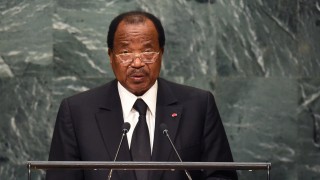A part of Cameroon is in crisis, with workers on strike, businesses on standstill and the whole region denied access to the internet, all because they speak a different, borrowed, language. As unbelievable as that seems, lawyers and teachers in English-speaking Southwestern Cameroon have been on strike to protest what they describe as long-held discrimination by the French-speaking central government.
Rather than seek a conciliatory and constructive resolution of the crisis, the central government, led by sit-tight President Paul Biya, have tried to strong-arm the region into submission, quashing a November protest — against the imposition of French speaking teachers and judges in English regions — with force which left half a dozen people dead, and cutting off internet access to the whole region. The conflict is emblematic of the several issues that continue to plague Cameroon, including but not limited to Paul Biya’s intolerance of dissent, the heavy-handedness of the country’s security agents and the underlying problems of poverty and underdevelopment. But beyond these factors, there is also the legacy of Franco-British colonialism, which is indeed the root cause of the country’s current crisis.
Cameroon’s current crisis emanates from long before Cameroonians spoke French or English, or even had a country in the modern sense of the word. Then, just after the first world war, which was essentially a battle of western nations over land, colonies, and egos, France and England took over Cameroon from Germany, the defeated villain, as part of their spoils of the war. Over the next sixty years, France would rule part of Cameroon, first as an assimilated country, then as an associated one, while Britain ran the other part as an add-on to its divide-and-ruled Nigeria. After undergoing different shades of colonial exploitation and abuse, both parts of Cameroon were once again lumped back together to form one independent nation.
However, like a person with an abusive childhood and exploitative parents, Cameroon has struggled to get its act together. French interference contributed in denying Cameroonians true democracy and, to make up for it, gave them a dictatorial president who has been in power since before more than half of the current population was born and has no plan to leave. In partnership with the British, the French also sowed the seed of socio-political and ethnocultural discord which is today tearing the Cameroonian society apart.
Since Cameroon’s reunification and independence, the English-speaking southwest has never really felt welcome. Although the Francophone-dominated central government would not hear of it — not even in English — that any part of the country seceded, it would also not make the policies and gestures that would lead to more inclusion of the English-speaking minority. Issues, ranging from the overt favouritism of French over the English language in a country that professes multilingualism, to more crucial problems like the socio-economic abandonment of the southwest region, have led to long-seething feelings of discrimination. With the central government responding to the region’s protests with brute force, there’s no estimating how bad the situation can get, and this tends to be the concurrent state of several French or British ex-colonies.
Nigeria may seem a stable nation getting by just fine with its recovery from the Boko Haram insurgency, but beneath the surface is a North/South divide threatening to explode at any time. Thirty months of a bloody civil war and forty-seven years of make-up efforts have done little to build a sustainable relationship between the former Northern and Southern Protectorates of Nigeria. One Muslim-dominated and the other largely Christian, both sides have struggled to live together under the country’s banner of Unity in Diversity, fighting for political domination, quarrelling over economics and despising each other on religious and cultural issues. The situation is similar in the Central African Republic, where the Christian majority has been engaged in a killing spree with the Muslim minority, leading to a national destabilisation on an unmatched scale. The Republic of Congo, Chad, Gabon, Mali, Sierra Leone, Sudan, Uganda, and several other Franco-British colonised states continue to suffer aftermaths of divide-and-rule colonial schemes. But there’s no gain wallowing in the grief of past injustices, these African countries must take the initiative to correct the wrongs of their colonial masters. And Cameroon can.
There is no good reason why bilingualism—or even multilingualism—should be a source of division in Cameroon. Put aside the miserable legacy of Franco-British colonialism and the insensitivities of the Cameroonian government as well its ineptitude in governance, Cameroon could become a commercial and cultural hub for the subcontinent by marketing itself as Africa’s melting pot of global languages. Switzerland did just that in Europe. Less than 9 million in population and with four official languages (Romansch, German, French and Italian) Switzerland is the hub of global activity with two of its cities — Zurich and Geneva — among the world’s top financial centres, art and cultural hubs as well as diplomatic rendezvous spots. The difference between the Swiss attraction and the Cameroon distraction is commitment and political will to turn perceived challenges into obvious opportunities. It’s time Cameroon and other African countries aspired towards the former, appreciating the scale of the divisions planted by colonial rule and western imperialism, and working internally — beyond ethno-regional differences — to overcome them.








